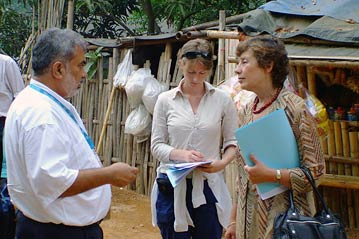Assistant High Commissioner in Syria
Assistant High Commissioner in Syria
Assistant High Commissioner for Protection Erika Feller is on the third day of a mission to Syria, where she has discussed the situation of Iraqi refugees with several senior officials in Damascus. She is also seeing first-hand the impact of the crisis, including meetings with Iraqi refugees in their homes, at UNHCR's registration facility in Damascus, and in community centres. Feller noted that while the effects of physical violence are very visible among the uprooted Iraqis, the equally painful psychological trauma they have suffered remains largely hidden from view.
In her discussions with Syrian officials, Feller is seeking to clarify recent reports that visa requirements for Iraqis entering the country will soon change. Although all of the officials she has met so far confirmed that there would be a new visa regime for Iraqis, no formal policy has yet been made available to UNHCR. According to government sources, all Iraqis wishing to enter Syria will have to apply for a visa from the Syrian Embassy in Baghdad.
Syria is the only country not to have imposed strict regulations on the entry of Iraqi refugees. Jordan, which hosts an estimated 500,000-750,000 Iraqis, has largely limited access to new arrivals, while other regional countries have tough visa regulations in place. Uncertainty about a change in visa regulations earlier this year led thousands of Iraqis to approach both UNHCR and Syrian immigration offices for clarification. This weekend, press reports about the new visa requirements caused great concern among the Iraqi population living in Syria, with a UNHCR hotline for refugees being inundated with calls from people asking how this would affect their situation.
Feller, who oversees UNHCR's protection work for nearly 33 million refugees and other people of concern worldwide, is continuing her efforts to obtain more information on how the visa rules may affect Iraqi refugees. So far, she has received assurances that the government does not intend to forcibly return Iraqi refugees currently living in Syria, estimated at some 1.4 million. She has expressed hope that the most vulnerable will continue to have access to the safe environment offered by Syria and that there be no forcible return. She has also highlighted the need for sustained international support to Syria in its efforts to cope with the huge number of Iraqis.
In talks at the Ministry of Foreign Affairs, Feller was told that the new visa restrictions arose from the fact that Syria's ability to handle the influx is close to the breaking point. Feller acknowledged the enormous pressure on Syrian society - its infrastructure, economy, security and energy resources - and reiterated UNHCR's appreciation for the generosity shown by the Syrian people.
Since the beginning of the year, UNHCR has issued two appeals aimed at helping countries in the region to cope with the humanitarian crisis. The first appeal commits US$41 million to Syria for humanitarian assistance. The second joint UNICEF-UNHCR appeal (if fully funded) will commit over US$63 million to support the education sector.
UNHCR has so far registered a total of 118,000 Iraqis in Syria and expects that figure to reach 200,000 by the end of the year. Many of them are seriously ill and victims of extreme violence and torture. Feller noted at least 2,000 people continue to flee their homes in Iraq daily.
On Wednesday Ms Feller will continue her trip to Lebanon.






